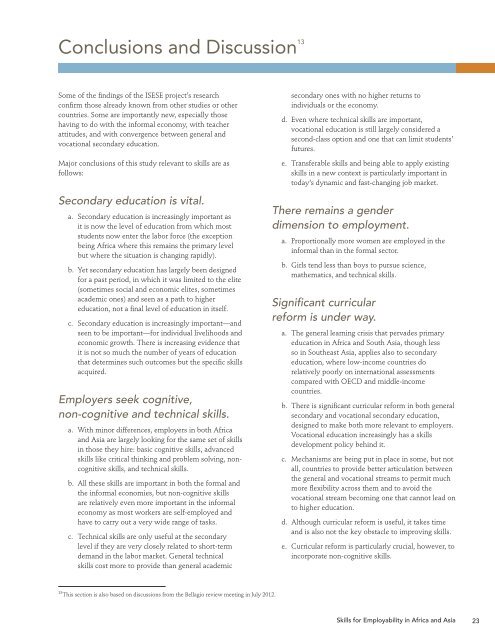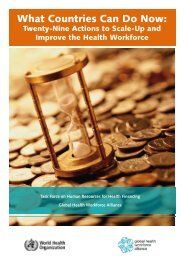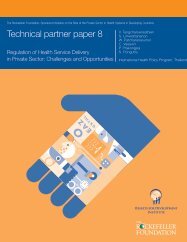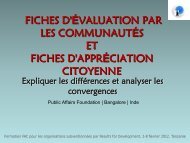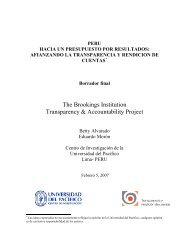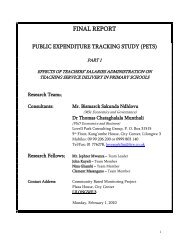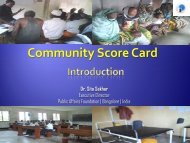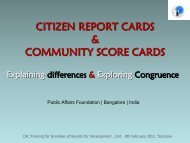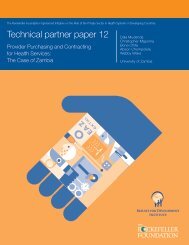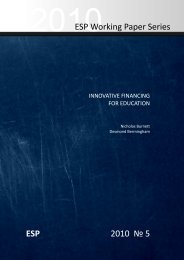Innovative Secondary Education For Skills Enhancement
Innovative Secondary Education For Skills Enhancement
Innovative Secondary Education For Skills Enhancement
You also want an ePaper? Increase the reach of your titles
YUMPU automatically turns print PDFs into web optimized ePapers that Google loves.
Conclusions and Discussion 13<br />
Some of the findings of the ISESE project’s research<br />
confirm those already known from other studies or other<br />
countries. Some are importantly new, especially those<br />
having to do with the informal economy, with teacher<br />
attitudes, and with convergence between general and<br />
vocational secondary education.<br />
Major conclusions of this study relevant to skills are as<br />
follows:<br />
<strong>Secondary</strong> education is vital.<br />
a. <strong>Secondary</strong> education is increasingly important as<br />
it is now the level of education from which most<br />
students now enter the labor force (the exception<br />
being Africa where this remains the primary level<br />
but where the situation is changing rapidly).<br />
b. Yet secondary education has largely been designed<br />
for a past period, in which it was limited to the elite<br />
(sometimes social and economic elites, sometimes<br />
academic ones) and seen as a path to higher<br />
education, not a final level of education in itself.<br />
c. <strong>Secondary</strong> education is increasingly important—and<br />
seen to be important—for individual livelihoods and<br />
economic growth. There is increasing evidence that<br />
it is not so much the number of years of education<br />
that determines such outcomes but the specific skills<br />
acquired.<br />
Employers seek cognitive,<br />
non‐cognitive and technical skills.<br />
a. With minor differences, employers in both Africa<br />
and Asia are largely looking for the same set of skills<br />
in those they hire: basic cognitive skills, advanced<br />
skills like critical thinking and problem solving, noncognitive<br />
skills, and technical skills.<br />
b. All these skills are important in both the formal and<br />
the informal economies, but non-cognitive skills<br />
are relatively even more important in the informal<br />
economy as most workers are self-employed and<br />
have to carry out a very wide range of tasks.<br />
c. Technical skills are only useful at the secondary<br />
level if they are very closely related to short-term<br />
demand in the labor market. General technical<br />
skills cost more to provide than general academic<br />
secondary ones with no higher returns to<br />
individuals or the economy.<br />
d. Even where technical skills are important,<br />
vocational education is still largely considered a<br />
second-class option and one that can limit students’<br />
futures.<br />
e. Transferable skills and being able to apply existing<br />
skills in a new context is particularly important in<br />
today’s dynamic and fast-changing job market.<br />
There remains a gender<br />
dimension to employment.<br />
a. Proportionally more women are employed in the<br />
informal than in the formal sector.<br />
b. Girls tend less than boys to pursue science,<br />
mathematics, and technical skills.<br />
Significant curricular<br />
reform is under way.<br />
a. The general learning crisis that pervades primary<br />
education in Africa and South Asia, though less<br />
so in Southeast Asia, applies also to secondary<br />
education, where low-income countries do<br />
relatively poorly on international assessments<br />
compared with OECD and middle-income<br />
countries.<br />
b. There is significant curricular reform in both general<br />
secondary and vocational secondary education,<br />
designed to make both more relevant to employers.<br />
Vocational education increasingly has a skills<br />
development policy behind it.<br />
c. Mechanisms are being put in place in some, but not<br />
all, countries to provide better articulation between<br />
the general and vocational streams to permit much<br />
more flexibility across them and to avoid the<br />
vocational stream becoming one that cannot lead on<br />
to higher education.<br />
d. Although curricular reform is useful, it takes time<br />
and is also not the key obstacle to improving skills.<br />
e. Curricular reform is particularly crucial, however, to<br />
incorporate non-cognitive skills.<br />
13 This section is also based on discussions from the Bellagio review meeting in July 2012.<br />
<strong>Skills</strong> for Employability in Africa and Asia 23


